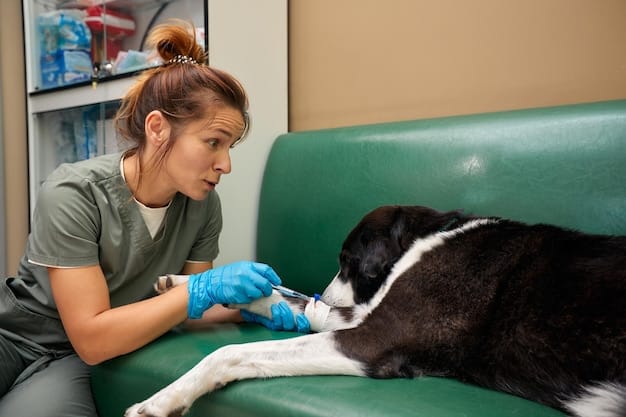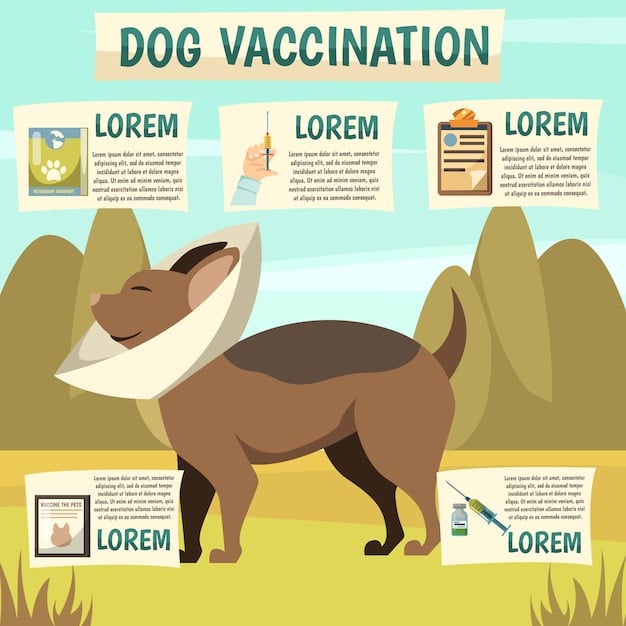Pet Vaccinations: A Comprehensive Guide for US Pet Owners

Understanding pet vaccinations is crucial for every owner in the US, encompassing both core vaccines, essential for all pets, and non-core vaccines, tailored to specific lifestyle and risk factors to protect against preventable diseases.
Ensuring your pet’s health is a top priority, and **understanding pet vaccinations: What every owner needs to know about core and non-core vaccines** is a cornerstone of preventative care, protecting them from a range of potentially life-threatening diseases.
Why Vaccinations are Essential for Your Pet
Vaccinations are a vital part of your pet’s healthcare, acting as a shield against various infectious diseases. They work by exposing your pet to a weakened or inactive form of a disease, stimulating their immune system to produce antibodies.
This process equips your pet’s body to recognize and fight off the actual disease if they ever encounter it, providing long-term protection and contributing to a healthier, happier life.
The Science Behind Pet Vaccines
Vaccines contain antigens that mimic disease-causing organisms, triggering an immune response without causing illness. This response leads to the production of antibodies, which remain in the pet’s system, ready to neutralize the actual pathogen upon exposure.
Benefits of Vaccinating Your Pet
Vaccinations provide numerous benefits, including preventing serious diseases, reducing the severity of illness, and minimizing the spread of infections to other animals. They also offer cost savings by preventing expensive treatments for preventable diseases.
- Prevents potentially fatal diseases.
- Reduces the risk of spreading diseases to other animals.
- Contributes to a longer and healthier life for your pet.
- Can save money on veterinary bills in the long run.
In summary, vaccinations are an essential component of responsible pet ownership, safeguarding your pet’s health and well-being and preventing the spread of infectious diseases.
Core vs. Non-Core Vaccines: What’s the Difference?
Pet vaccinations are divided into two main categories: core and non-core. Core vaccines are considered essential for all pets, regardless of their lifestyle, while non-core vaccines are recommended based on individual risk factors and exposure.
Understanding the difference between these two categories is crucial in making informed decisions about your pet’s vaccination plan, ensuring they receive the necessary protection against prevalent and potentially dangerous diseases.
Core Vaccines: Essential Protection for All Pets
Core vaccines protect against diseases that are highly contagious, pose a significant health risk, and are often fatal. These vaccines are recommended for all pets, regardless of their breed, age, or lifestyle.
Non-Core Vaccines: Tailored to Your Pet’s Lifestyle
Non-core vaccines are recommended based on your pet’s individual risk factors, such as their lifestyle, geographic location, and exposure to other animals. These vaccines protect against diseases that are less common or pose a lower risk to most pets.

- Core vaccines provide essential protection against common and severe diseases.
- Non-core vaccines offer additional protection based on individual risk factors.
- Consult your veterinarian to determine the best vaccination plan for your pet.
- Consider your pet’s lifestyle and potential exposure when deciding on non-core vaccines.
In conclusion, understanding the difference between core and non-core vaccines is essential for creating a comprehensive vaccination plan that protects your pet from preventable diseases based on their individual needs and risk factors.
Core Vaccines for Dogs in the US
In the United States, core vaccines for dogs include protection against rabies, distemper, parvovirus, and adenovirus. These diseases are highly contagious and can be fatal, making vaccination essential for all dogs.
Ensuring your dog receives these core vaccines is a critical step in safeguarding their health and well-being, preventing them from contracting these dangerous and potentially life-threatening illnesses.
Rabies Vaccine: A Legal Requirement
The rabies vaccine is not only crucial for your dog’s health but is also legally required in most states. Rabies is a fatal viral disease that affects the central nervous system and can be transmitted to humans.
DHPP Vaccine: Protecting Against Multiple Diseases
The DHPP vaccine is a combination vaccine that protects against distemper, adenovirus (hepatitis), parvovirus, and parainfluenza. These diseases can cause severe illness, including fever, vomiting, diarrhea, and neurological damage.
- Rabies vaccination is legally mandated in most US states.
- DHPP vaccine protects against several highly contagious diseases.
- Core vaccines are essential for all dogs, regardless of lifestyle.
- Consult with your veterinarian about booster schedules for core vaccines.
In summary, core vaccines for dogs in the US, including rabies and DHPP, are essential for protecting against highly contagious and potentially fatal diseases, ensuring your dog’s health and complying with legal requirements.
Non-Core Vaccines for Dogs in the US
Non-core vaccines for dogs in the US are recommended based on lifestyle and risk factors. Some common non-core canine vaccines include those for Bordetella, Lyme disease, leptospirosis, and canine influenza. These protect against diseases that pose a risk for dogs with specific exposures.
Consider your dog’s lifestyle, environment, and potential contact with other animals when deciding on non-core vaccines to ensure they receive the targeted protection they need.
Bordetella Vaccine: Protecting Against Kennel Cough
The Bordetella vaccine is recommended for dogs who are frequently in contact with other dogs, such as in boarding facilities, dog parks, or grooming salons. Bordetella is a common cause of kennel cough, a highly contagious respiratory infection.
Lyme Disease Vaccine: For Dogs in Tick-Prone Areas
The Lyme disease vaccine is recommended for dogs living in or traveling to areas where ticks are prevalent. Lyme disease is a bacterial infection transmitted by ticks and can cause joint pain, fever, and kidney damage.

- Bordetella vaccine is recommended for dogs in social settings.
- Lyme disease vaccine is important for dogs in tick-prone areas.
- Leptospirosis vaccine can protect against a bacterial disease transmitted through contaminated water.
- Canine influenza vaccine is recommended for dogs at high risk of exposure.
In conclusion, non-core vaccines for dogs in the US, such as those for Bordetella, Lyme disease, leptospirosis, and canine influenza, provide targeted protection against diseases based on individual lifestyle and risk factors, ensuring comprehensive health coverage.
Core Vaccines for Cats in the US
Similar to dogs, cats also require core vaccinations to protect against common and potentially fatal diseases. The core vaccines for cats in the US include those for feline viral rhinotracheitis, calicivirus, panleukopenia (feline distemper), and rabies.
These vaccines are considered essential for all cats, regardless of whether they are indoor or outdoor, ensuring they have a strong defense against these prevalent and dangerous illnesses.
FVRCP Vaccine: A Vital Combination
The FVRCP vaccine is a combination vaccine that protects against feline viral rhinotracheitis (feline herpesvirus), calicivirus, and panleukopenia (feline distemper). These diseases can cause severe respiratory and gastrointestinal illness.
Rabies Vaccine: Protecting Against a Deadly Virus
As with dogs, the rabies vaccine is crucial for cats and is often legally required. Rabies is a fatal viral disease that affects the central nervous system and can be transmitted to humans.
- FVRCP vaccine protects against common upper respiratory and gastrointestinal diseases.
- Rabies vaccine is essential for all cats and is often legally required.
- Core vaccines provide a foundation of protection for your cat’s health.
- Consult your veterinarian about the appropriate vaccination schedule for your kitten or cat.
In summary, core vaccines for cats in the US, including FVRCP and rabies, are essential for protecting against prevalent and potentially fatal diseases, ensuring your cat’s health and complying with legal requirements.
Non-Core Vaccines for Cats in the US
Non-core vaccines for cats in the US are recommended based on lifestyle and risk factors. The most common non-core vaccine for cats is the feline leukemia virus (FeLV) vaccine, which can protect against a potentially deadly disease.
Consider your cat’s lifestyle, especially if they go outdoors or interact with other cats, when deciding whether to pursue the FeLV vaccine, ensuring they have targeted protection against this virus.
FeLV Vaccine: Protecting Outdoor Cats
The FeLV vaccine is highly recommended for cats who spend time outdoors or live in multi-cat households, as FeLV is transmitted through saliva, nasal secretions, and urine. Feline leukemia virus can cause immune suppression, anemia, and cancer.
Considering Your Cat’s Lifestyle
If your cat is strictly indoors and has no contact with other cats, the FeLV vaccine may not be necessary. However, it is always best to consult with your veterinarian to determine the best vaccination plan for your individual cat.
- FeLV vaccine is highly recommended for outdoor cats and those in multi-cat households.
- FeLV can cause severe health problems, including immune suppression and cancer.
- Consult with your veterinarian to assess your cat’s risk factors for FeLV.
- Vaccination is a key component of preventing FeLV infection in at-risk cats.
In conclusion, the non-core FeLV vaccine for cats in the US provides targeted protection against feline leukemia virus for cats at higher risk of exposure, ensuring comprehensive health coverage based on lifestyle and risk factors.
| Key Point | Brief Description |
|---|---|
| 💉 Core Vaccines | Essential for all pets, regardless of lifestyle. |
| 🐾 Non-Core Vaccines | Recommended based on individual risk factors. |
| 🐕 Dog Core Vaccines | Include Rabies and DHPP. |
| 🐈 Cat Core Vaccines | Include FVRCP and Rabies. |
Frequently Asked Questions
▼
Core vaccinations protect pets from severe, life-threatening diseases that are highly contagious. They are considered essential for all pets to ensure their basic health and well-being, regardless of lifestyle.
▼
The frequency of booster shots varies depending on the vaccine type and your pet’s individual health. Your veterinarian will create a vaccination schedule tailored to your pet’s needs, ensuring they maintain optimal protection.
▼
While vaccinations are generally safe, some pets may experience mild side effects, such as soreness or fever. Severe reactions are rare. Discuss any concerns with your vet to make informed decisions about your pet’s health.
▼
Non-core vaccines are optional and recommended based on a pet’s lifestyle and risk factors. Examples include vaccines for Lyme disease, feline leukemia, and kennel cough. They offer protection against specific environmental or social risks.
▼
Consulting with your veterinarian is vital for determining the best vaccination plan. They will assess your pet’s age, health, lifestyle, and potential exposure to diseases to create a personalized vaccination schedule.
Conclusion
Understanding the importance of **pet vaccinations**, both core and non-core, is essential for every pet owner. By working closely with your veterinarian, you can develop a comprehensive vaccination plan that protects your furry friend from preventable and potentially deadly diseases, ensuring a long, happy, and healthy life together.





